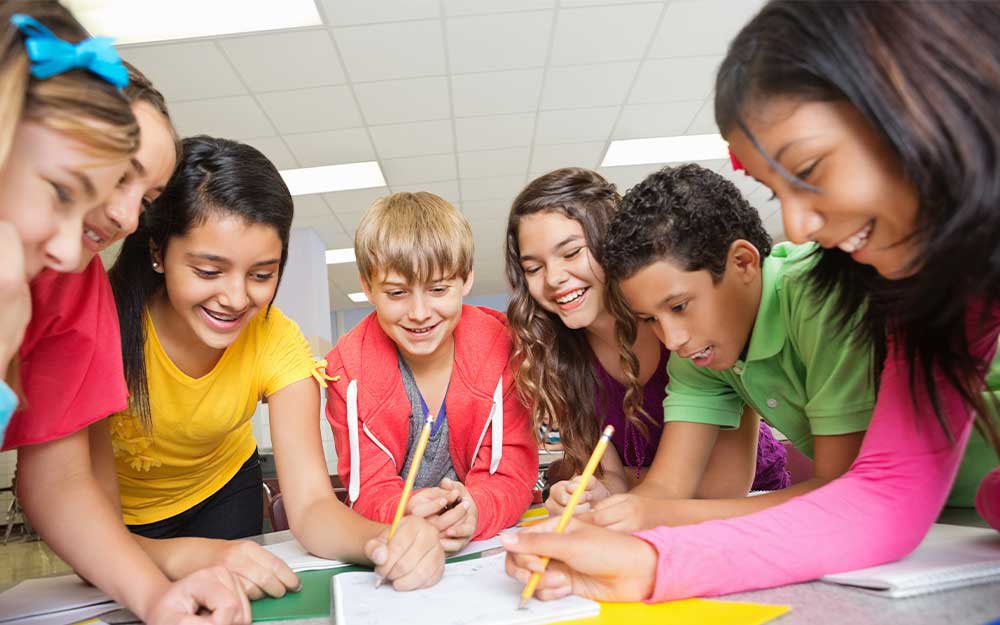While having time to recharge is essential for everyone, excessive time at home typically has more drawbacks than benefits. Encouraging kids and teens to participate in prosocial activities, even with the ongoing pandemic, is important to prioritize.
What are prosocial activities?
Prosocial activities involve social skill building and often collaboration with similarly aged kids. While participation in sports is one of the most common forms of social skill development, prosocial activity can also include:
- Clubs (e.g., art, chess, biking, robotics, scouts, etc.)
- Recreational classes
- Day camps or overnight camps
- Creative arts/music/theater
- Volunteer opportunities through a religious or community organization
According to Amanda Heins, PsyD, supervising psychologist, not engaging in these kinds of activities can be detrimental to a child’s mental health, well-being, and overall development.
Why are prosocial activities beneficial for kids’ mental health?
Dr. Heins says prosocial activities “offer natural ways to learn, practice, and strengthen life and social skills. These essential skills can boost mood and overall mental health and well-being.”
Prosocial activities and organized sports can also have positive implications on self-esteem, the ability to collaborate, problem solve, building empathy toward self/others, and resilience.
“With many of these activities, not every day will be perfect,” Dr. Heins explains. “Going through challenging situations (e.g., tough loss in a sport game) helps to build that resilience and growth mindset. All these learning moments are essential. When you have these key ingredients in place, the sky is the limit in terms of what you can strive for.”
For mental health, Dr. Heins points out symptoms of depression and anxiety often improve with participation in prosocial activities.
“Anxiety and depression often lead people to believe they need to stay home (i.e., avoid) because it is the only ‘safe place’ for the anxiety and depression to live,” she shares. “Unfortunately, excessive isolation and avoidance fuels symptoms. This is why involvement in physically active clubs are essential. These activities directly reframe the parameters of depression and anxiety.”
Physical activity and prosocial skill building, the ultimate package
Prosocial activities that involve a physical component, like sports or clubs, provide additional benefits.
“Physical activity has many benefits for kids. Regular exercise keeps them physically healthy. Organized sports or physically active clubs like biking, rock climbing and adventure racing, allow for practicing of essential social skills and building and sustaining friendships while being physically active. It is the ultimate package deal.”
Research also has shown kids and teens who are physically active tend to sleep better, perform better in school, and can manage stress more effectively.
“Often, the organized sports kids participate in are connected to their school or local community,” she continues. “This adds an additional benefit, as your child will strengthen friendships with peers they also see at school every day. Having healthy friendships in school also creates a natural motivator to attend school daily. Physical activity also has positive implications on mental health, especially anxiety, depression, and ADHD.
How to talk about participation in activities
If your child or teen seems disinterested in, or resistant to, participating in a prosocial activity, Dr. Heins suggests approaching the conversation from a place of curiosity. Ask them what they believe the activity will entail (to confirm whether they have an accurate understanding) and what feelings and questions they have.
Dr. Heins recommends parents encourage their children to talk with their friends to see what activities they are involved in (or you and your child can reach out to their friends’ parents). Ultimately, the best way to find a prosocial activity that your child or teen will enjoy is by working collaboratively with them.
“It is important to set clear and realistic expectations,” she says. “Identify the number of activities you believe your child can manage, while also balancing school and other responsibilities. This way, your child understands it is not a question of whether they participate in an activity, it is a matter of which activities.”
Looking ahead to a new school year
For more information about supporting children with anxiety or other mental health challenges during the upcoming school year, listen to our “Understanding School Refusal” podcast.
Anxiety and depression care at Rogers
When anxiety, depression, and other mental health concerns are interrupting someone’s ability to find enjoyment in their favorite activities, this can be an indicator that it’s time to seek help. Rogers offers mental health treatment for children, teens, and adults with four levels of care. Request a free, confidential screening by calling 800-767-4411.


